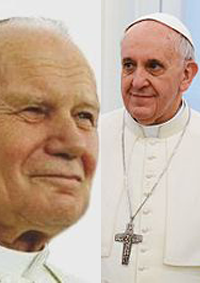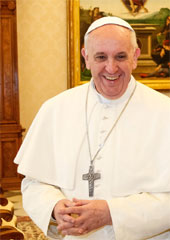Venezuela Today Vs. the Polish Liberation Episode
Pope Francis and John Paul II are both transformative figures.
March 26, 2014

An interesting argument can be made that Pope Francis and the Vatican may be the one force in the world that might keep all the political, social and economic strife in Venezuela from boiling over into a full-blown civil war.
As Johanna Mendelson Forman argues convincingly, all the other players – from regional organizations to the U.S. government – are either ineffective or tainted.
Her suggestion for Pope Francis to step into this breach is on point. He will need to tread a bit carefully, though. Francis’s true predecessor, both in terms of public effect and charisma, was of course the Polish-born Cardinal Karol Józef Wojtyla, who served as Pope John Paul II from 1978 to 2005.
His name is intimately connected with the removal of Communist rule over his home country, Poland. John Paul II played a very active role throughout the entire process of liberating Poland from Communist oppression.
He first shepherded the movement along when he was still based in Krakow. He then used his post in Rome for trips into his homeland and as a pivotal platform for global diplomacy to trigger and to safeguard the step-by-step progress that was made in confronting – and then overcoming – martial law and the many other obstacles in the way that had to be removed.
That historical precedent may make the Venezuelan government queasy. But there is nothing wrong with putting the Cuban military advisers who are working closely with President Maduro in Venezuela on notice. As good communists, they would love to see the Bolivarian revolution continue in that country.
Social justice for the region
Which is precisely why a successful papal intervention would be a truly big win, not just for the country, but for all of Latin America. It would show a constructive way forward, not just for restoring more democratic practices – but also for seeing vital social justice goals accomplished.
The circumstances of Poland then and Venezuela now are very different. The first was always an oppressive, little-loved regime. The latter has turned more and more oppressive over time, but used to have a lot of resonance in the population at large.
Moreover, on the key issue that Hugo Chavez always made his hallmark – fighting poverty – Pope Francis has a lot of credibility.
And unlike John Paul II, who – given his focus on anti-communism, could have been seen by some as an “American agent,” nobody in his right mind could say anything of the kind about Francis.
That is just one of the reasons that makes a papal “intervention” in Venezuela such a promising prospect.
Takeaways
Read previous

The New Theology of (Global) Hope
March 26, 2014
